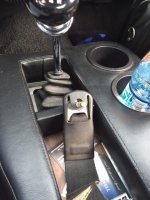Quote:
Originally Posted by robert campbell
Racing fuel could make a huge difference if you tune the car to it, and then use it consistently. Octane booster could have the same effect to a lesser degree.
The key word is consistently. A perfectly tuned to 92 octane 10 to 1 compression motor would ping all over itself on racing fuel. Racing fuel is much more volatile, explodes more quickly, and produces much more “power per given explosion” in the cylinder. You would need to retard your timing, recurve your distributor, and maybe rejet on the carb.
Rob
Yep, David, that's consistent w/my understanding if "racing fuel" = higher octane. As the octane rating increases the tendency for the fuel to detonate from the heat of compression (before the spark plug fires) reduces. In that sense higher octane is less volatile. So for high compression engines low octane fuel causes pinging. For lower compression engines using higher octane is just a waste of money. There is no more energy/gal in higher octane fuel.
BTW: For those of us living in CA where the highest octane is 91 (which is marginal on a 10:1 compression engine) there are some (only a few) Union 76 stations that do sell high octane gas. Two in the south bay area as far as I know. The racing fuels that 76 produces are...
http://www.ggoil.com/racing.htm
Otherwise if you use 91 octane gas you end up having to tune the engine away from its optimal operating point by retarding(?) the spark a bit. But this retarding of the spark means less performance and poorer gas mileage as it is not optimal for the design of the engine (someone please correct me if I'm off base with any of this). But it stops the pinging with the low octane gas.
James
Originally Posted by robert campbell

Racing fuel could make a huge difference if you tune the car to it, and then use it consistently. Octane booster could have the same effect to a lesser degree.
The key word is consistently. A perfectly tuned to 92 octane 10 to 1 compression motor would ping all over itself on racing fuel. Racing fuel is much more volatile, explodes more quickly, and produces much more “power per given explosion” in the cylinder. You would need to retard your timing, recurve your distributor, and maybe rejet on the carb.
Rob
I dont know if you consider 100 octane VP gasoline as "racing fuel." I know i do, but i never have had a problem pinging with the 100 octane VP fuel with my car dyno tuned to CA 91 octane from the pump. I always race with the 100 octane VP fuel at the track, especially now for the Nitrous. I can't even run the nitrous on the 91 from the pump is what im told. I would tune the car to the 100 octane gas for the track, but then once i'm done racing, i have to put 91 in it to make it home because i dont trailer the car yet and then it would ping on me. So, i get the car tuned for 91 and then put 100 octane in it to be safe at the track, to make a little more power, and so i can safely run my Nitrous. Even though the car isnt tuned for 100, it feels stronger with the 100 on a CA 91 tune, but im sure i don't reap all the benefits as if i had it tuned on the 100, but i've never experienced pinging with a higher octane fuel than what the car is tuned for.
Yep, David, that's consistent w/my understanding if "racing fuel" = higher octane. As the octane rating increases the tendency for the fuel to detonate from the heat of compression (before the spark plug fires) reduces. In that sense higher octane is less volatile. So for high compression engines low octane fuel causes pinging. For lower compression engines using higher octane is just a waste of money. There is no more energy/gal in higher octane fuel.
BTW: For those of us living in CA where the highest octane is 91 (which is marginal on a 10:1 compression engine) there are some (only a few) Union 76 stations that do sell high octane gas. Two in the south bay area as far as I know. The racing fuels that 76 produces are...
http://www.ggoil.com/racing.htm
Otherwise if you use 91 octane gas you end up having to tune the engine away from its optimal operating point by retarding(?) the spark a bit. But this retarding of the spark means less performance and poorer gas mileage as it is not optimal for the design of the engine (someone please correct me if I'm off base with any of this). But it stops the pinging with the low octane gas.
James

